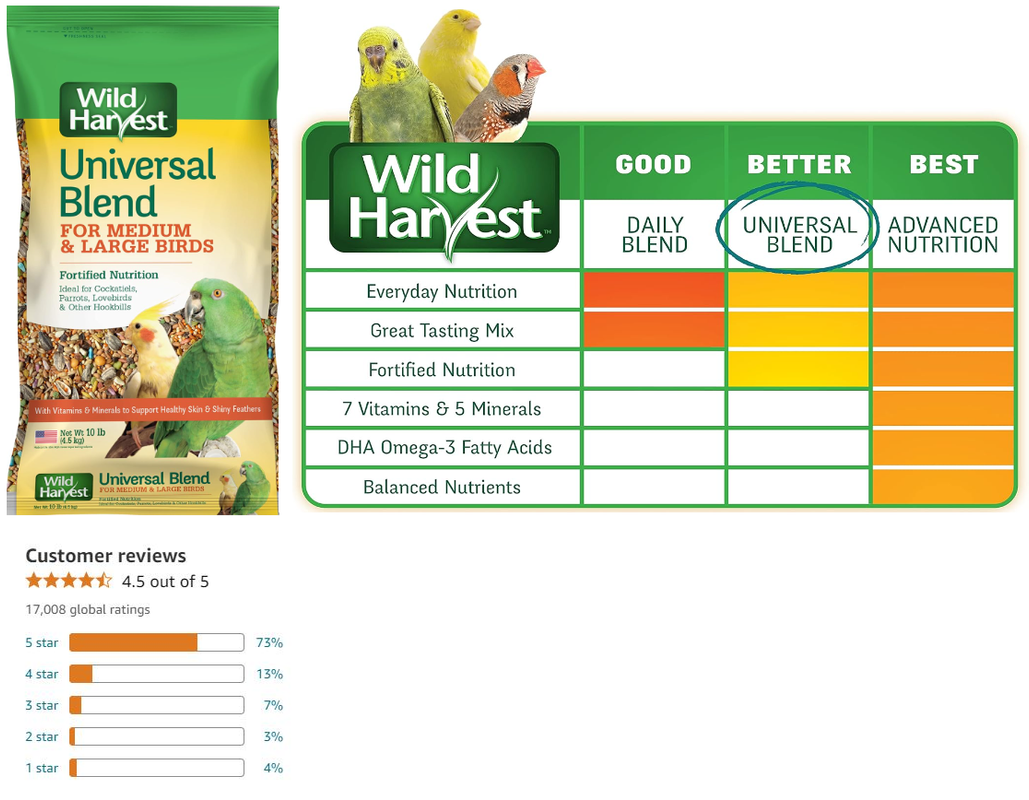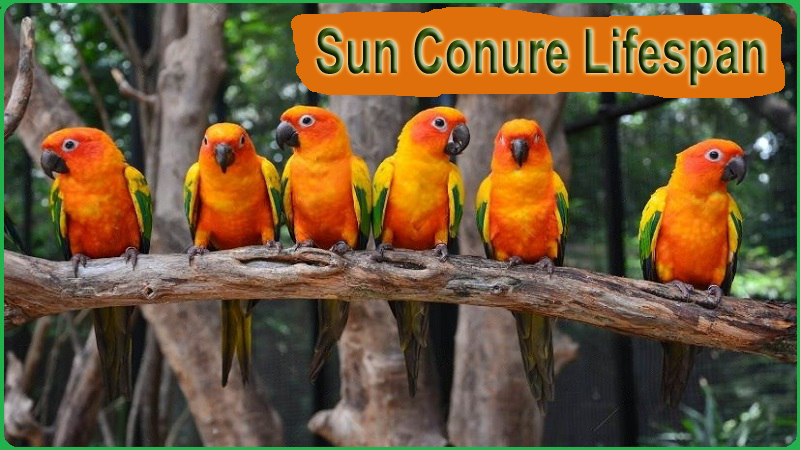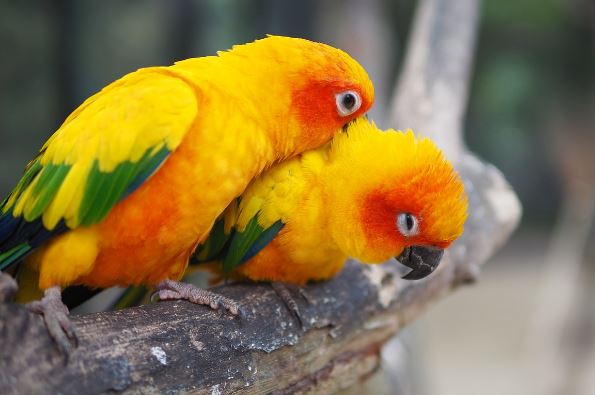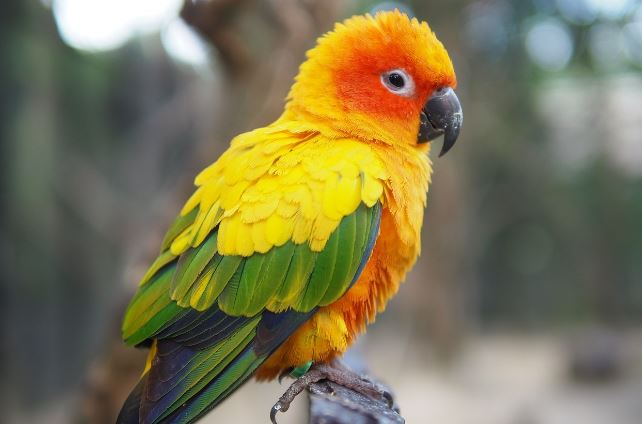Sun Conures is also known as Sun Parakeets. The average Sun Conure lifespan ranges about 15 to 30 years in captivity. But, this life range can be influenced by some factors like as genetics, diet, environment, and healthcare. In the wild, their lifespan tends to short, typically around 10 to 15 years, due to natural predators, diseases, and habitat loss.
Sun Conures lifespan depends on a high-quality pellets, fresh fruits, vegetables, and occasional seeds. To reduce boredom and stress, provide stimulating environment with of toys, mental activities, and social interaction.
Serve a proper veterinary care to detect and treatment of potential health problems. Ensure a clean, spacious, and safe living environment to support well life and longevity.
How Long Do Sun Conures Live in Captivity?
In captivity, Sun Conures can typically live between 15 to 30 years. But, this life is not fixed; it can short or long due to essential various factors, such as proper care, diet, environment, and regular vet check-ups. If, you give a optimal care, then some Sun Conures birds can even live beyond 30 years.
A balanced diet is most important point for their longevity. To grab necessary nutrients, Sun Conures need high-quality pellets, fresh fruits, vegetables, and occasional seeds. But, some dangerous foods (avocado, chocolate, caffeine, & alcohol) always keep away from them, because these can be toxic to your pet birds.
Stimulating and safe environment make significantly impacts on their lifespan. Sun Conures need to spacious cages equipped with toys, perches, mentally and physically engaged to thrive. You have to make regular interaction with your pet birds, because these highly social creatures can suffer from stress and behavioral issues if left alone in long periods.

It is essential routine veterinary care to this bird. An avian vet easily detects and treats of major health issues early with annual check-ups. Thus, it significantly contributes to a longer, healthier life for your Sun Conure parrot.
Lifespan of Sun Conures in The Wild
In the wild, Sun Conures bird has a shorter lifespan as compared in captivity. It is typically ranging about 10 to 15 years. There are several environmental concerns that get reduce their lifespan. One of them is predation by larger birds, mammals, and reptiles. Due to deforestation and human encroachment, reduces their natural living spaces and food sources.
In the wild, Sun Conure parrots are also susceptible to diseases and parasites that can get spread fast through flocks. Sometime, food availability also get inconsistent and scarcity that can impact on their health and longevity. Few natural disasters, such as storms and fires, further threaten their survival.
Despite of these challenges, Sun Conures are capable to adapt well to their environment. They come in social birds, those often living in flocks. In the forest, they easily grab a variety of seeds, fruits, nuts, and vegetation.
Factors that Can Shorten Sun Conure Lifespan
There are many factors can significantly shorten the lifespan of Sun Conures, both in captivity and in the wild.
Also Read: Macaws Lifespan in Wild & Captivity
Poor Diet
If, you offer imbalanced or deficient diet to your parrot, then it can lead causes of health issues. Due to lack essential nutrients (vitamins A and D, calcium, & minerals) in diet can pose to severe health issues. Despite of this, allowing toxic foods like avocado, chocolate, caffeine, and alcohol can be fatal for them.
Inadequate Housing and Environment
Sun Conure birds have to need more spacious and clean living environments. Offer conjused, cramped cages can lead to physical and psychological stress. Beyond of, dirty cages can harbor bacteria and parasites that lead to infections and diseases. Exposure to extreme temperatures and direct sunlight can also be harmful for them.
Lack of Mental Stimulation
Sun Conures are highly intelligent and social birds, so they need regular mental stimulation and interaction. Otherwise, boredom and loneliness can suffer stress-related issues such as feather plucking.
Insufficient Social Interaction
Sun Conures longevity also depends on social interaction with their human caregivers or other birds. They can get depression, if, you do isolate them. Due to this, it leads to a weakened immune system and increased susceptibility to diseases.
Neglect of Regular Veterinary Care
Never ignore annually veterinary check-ups, because vet detects and treatment of potential health problems. If, you do neglect of routine health care, then it can pose many undiagnosed illnesses that may convert severe or fatal over time.
Exposure to Toxins
Sun Conures are also more sensitive to several household toxins. This includes, fumes from non-stick cookware, tobacco smoke, aerosol sprays, and specific cleaning items. They can pose respiratory problems and poisoning; if they get exposure to these.
Stress and Anxiety
If, these birds exposure to loud noises, sudden changes in the environment, and other stressors; then can negatively impact the health. Chronic stress can contribute to weak their immune system that making them get more suspects to diseases.
Predation and Accidents
In the wild, larger birds, mammals, and reptiles do predate of Sun Conure birds. Apposite, as pet, occur many accidents such as escaping from the cage, get injure by other pets, or intake harmful objects can also shorten their lifespan.
Genetic Factors
Due to inherited genetic conditions, it can predispose Sun Conure parrots to various health issues that can affect their lifespan. So, you should adopt the responsible breeding practices to minimize the risk of genetic disorders.
Sun Conure Size Comparison
Here, you will look size comparison of Sun Conure with various dimensions and metrics to other common birds and objects:
Also Read: Crimson Rosella: Care, Diet, Fact, & History (With Pictures)
Size Metrics of the Sun Conure
- Length: Approximately 30 cm (12 inches) from head to tail.
- Wingspan: Roughly 43 cm (17 inches).
- Weight: Between 100 to 130 grams (3.5 to 4.6 ounces).
Comparison with Other Birds
Budgerigar (Budgie)
- Length: 18 cm (7 inches).
- Wingspan: About 30 cm (12 inches).
- Weight: Around 30-40 grams (1-1.4 ounces).
- Comparison: Sun Conures are larger, almost twice the length and with a broader wingspan.
Cockatiel
- Length: 30 to 33 cm (12-13 inches).
- Wingspan: Around 50 cm (20 inches).
- Weight: 90-110 grams (3-4 ounces).
- Comparison: Similar in length but with a slightly smaller wingspan. Sun Conures are marginally heavier.
African Grey Parrot
- Length: 33 cm (13 inches).
- Wingspan: Approximately 46-52 cm (18-20 inches).
- Weight: 400-600 grams (14-21 ounces).
- Comparison: Sun Conures are much smaller and lighter.
Lovebird
- Length: 14 cm (5.5 inches).
- Wingspan: Around 24 cm (9.5 inches).
- Weight: 40-60 grams (1.4-2.1 ounces).
- Comparison: Sun Conures are larger, with almost double the length and a significantly larger wingspan.
How to Extend Lifespan of Sun Conure Bird?
Extending the lifespan of a Sun Conure, you have to need a proper care and give attention to various aspects of their health. Here are some essential strategies to ensure your Sun Conure lives a long, healthy, and happy life:
Also Read: Quaker Parrot Colors Mutation: A Spectrum of Colors
Balanced Diet
Provide high-quality commercial pellets as the staple of their diet to grab essential nutrients.
Add variety of fresh fruits and vegetables in their diet. Always keep away them from toxic foods such as avocado, chocolate, caffeine, and alcohol.
Give seeds and nuts as occasional treats. But, you should not add the main diet due to their high fat content.
Should always offer clean and fresh water at all times.
Proper Housing and Environment
Offer facilitates a large, spacious cage, they move around freely. Ensure cage is constructed with safe and non-toxic materials.
You should always clean the cage, food, and water dishes, so that less probability of bacterial growth and infections.
Always keep the cage in a draft-free area that away from direct sunlight, high temperatures, and dangerous fumes.
Mental and Physical Stimulation
To make high engagement of mentally and physically, provide variety of toys, perches, and activities. Always rotate toys regularly to maintain their interest.
You always keep supervise them, when they outside the cage for exercise and exploration. Allow them supervised time outside the cage for exercise and exploration.
Social Interaction
Daily, you should spend quality time with your Sun Conure birds. They thrive easily on social interaction and can get depress, if left alone for long periods.
If possible, should consider having another bird to provide companionship. But, ensure proper introductions and compatibility.
Regular Veterinary Care
Make schedule annual check-ups with an avian vet to monitor their health and catch any potential issues early.
Take quickly veterinary care, if your bird shows signs of illness or injury. You should always check for changes in behavior, appetite, and appearance.
Safe and Enriching Environment
Keep your Sun Conure away from household toxins such as non-stick cookware fumes, tobacco smoke, aerosol sprays, and certain cleaning products.
Should make a plan in place for emergencies, including knowing the location of the nearest avian vet.
Monitor Behavior and Health
Should be always attentive them to any changes in behavior, appetite, or physical appearance. If, you detect any issue early, then it can be more effective treatment.
Keep maintain a healthy weight for your bird with allowing a balanced diet and regular exercise.
Stress Reduction
Maintain a stable routine to reduce stress. Sudden changes in environment, diet, or schedule can be stressful for birds.
Provide a calm and quiet environment, especially during night-time, to ensure they get enough rest.
Responsible Breeding
If, you purchase them from a breeder, then choose one who practices responsible breeding to ensure the genetic health of the birds.
Sun Conure Parrot Life Cycle
Here, we will spread light on the sun conure parrot life cycle:
Also Read: How Long Do African Grey Parrots Live? African Grey Lifespan
Egg Stage
- Duration: 23-27 days
- Description: Female Sun Conure lays 3-5 eggs. Incubation is primarily done by the female, with occasional assistance from the male.
Hatchling Stage
- Duration: Birth to 3 weeks
- Description: Chicks are born blind, naked, and helpless. They rely completely on parents for warmth and feeding.
Nestling Stage
- Duration: 3 weeks to 8 weeks
- Description: Chicks start developing feathers and their eyes open. Parents feed and care them to ensure well-being.
Fledgling Stage
- Duration: 8 weeks to 12 weeks
- Description: Chicks begin to leave the nest, learning to fly and forage under parents’ supervision. They start to become more independent.
Juvenile Stage
- Duration: 3 months to 1 year
- Description: Young Sun Conures continue to develop physically and socially. They practice flying, foraging, and social interactions.
Adult Stage
- Duration: 1 year and onwards
- Description: Sun Conures reach sexual maturity at around 1-2 years of age. They establish territories, form pair bonds, and eventually reproduce.
Lifespan
- Duration: 20-30 years in captivity with proper care
- Description: Lifespan depends on factors such as diet, environment, and healthcare. In the wild, lifespan might be shorter due to predators and environmental challenges.
FAQs (Frequently Asked Questions)
How Long Do Sun Conures Live As Pets?
Typically, Sun Conures live between 20 to 30 years as pets with genius care. Their lifespan can be influenced by their diet, veterinary care, mental and physical stimulation, and safe living environment.
What is Average Lifespan of Sun Conures Parrot?
In captivity, Sun Conures have an average lifespan of about 20 to 30 years with proper care. But, in the wild, their lifespan depend on many factors such as predation, availability of food, and environmental conditions. So, it is generally shorter, typically around 10 to 15 years.
At What Age Can Sun Conures Breed?
Sun Conures can typically begin breeding at around 1 to 2 years of age. They reach sexual maturity within this period, but it’s advisable to ensure they are healthy and well-developed before allowing them to breed.
Can Sun Conures Die from Loneliness?
While loneliness alone may not cause death, lack of social interaction can lead to depression and stress, which can negatively impact a Sun Conure’s overall health and lifespan.
Final Remarks
As result of this post, the lifespan of sun conure parrot is impacted by a various causes including genetic factors, proper care, and environmental condition level.
The parrot owners can contribute to longevity of captivating parrots by offering the balanced diet, and regular veterinary check-up.
Also Read: Do Cockatiels Have Ears? Their Unique Hearing
Do you have any experience, tips, tricks, or query regarding on this? You can drop a comment!
Have a Nice Day!!






